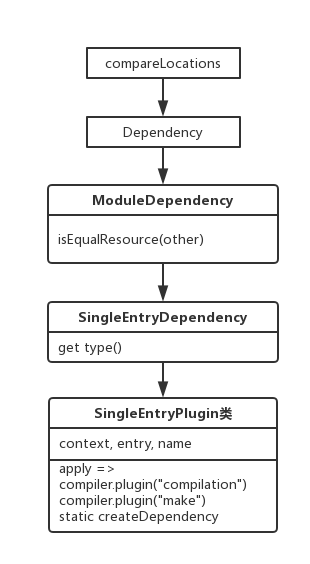呃,终于到了这地方……
newCompilation(params) { // ... this.applyPlugins("this-compilation", compilation, params); // 31 console.log(this._plugins['compilation'].length); this.applyPlugins("compilation", compilation, params); return compilation; }
MMP,有31个函数,估计可以写到明年了。
这里先梳理所有事件的注入来源,经检测,全部来源于WebpackOptionsApply中,回到那个可怕的模块,梳理后如下:
class WebpackOptionsApply extends OptionsApply { constructor() { super(); } process(options, compiler) { // ... if (typeof options.target === "string") { // ... switch (options.target) { case "web": JsonpTemplatePlugin = require("./JsonpTemplatePlugin"); NodeSourcePlugin = require("./node/NodeSourcePlugin"); compiler.apply( new JsonpTemplatePlugin(options.output), // plugin + 3 new FunctionModulePlugin(options.output), new NodeSourcePlugin(options.node), new LoaderTargetPlugin(options.target) ); break; // ... } } // ... // plugin + 1 compiler.apply(new EntryOptionPlugin()); compiler.applyPluginsBailResult("entry-option", options.context, options.entry); // plugin + 24 compiler.apply( /**/ ); compiler.apply( /**/ ); // ... // plugin + 1 compiler.apply(new TemplatedPathPlugin()); // plugin + 1 compiler.apply(new RecordIdsPlugin()); // plugin + 1 compiler.apply(new WarnCaseSensitiveModulesPlugin()); // ... return options; } }
还好都集中在一个地方,这样又可以写流水账了。
这里先要过一个地方,之前似乎遗留了:
compiler.apply(new EntryOptionPlugin()); compiler.applyPluginsBailResult("entry-option", options.context, options.entry);
这里注入了entry-option事件流,并在下一行代码触发,所以直接进去看实现:
function itemToPlugin(context, item, name) { if (Array.isArray(item)) { return new MultiEntryPlugin(context, item, name); } return new SingleEntryPlugin(context, item, name); } module.exports = class EntryOptionPlugin { apply(compiler) { // context => options.context // entry => options.entry compiler.plugin("entry-option", (context, entry) => { // 针对单字符串或数组情况 if (typeof entry === "string" || Array.isArray(entry)) { // 输出文件为main compiler.apply(itemToPlugin(context, entry, "main")); } // 对象 => 多入口 else if (typeof entry === "object") { Object.keys(entry).forEach(name => compiler.apply(itemToPlugin(context, entry[name], name))); } // 函数 else if (typeof entry === "function") { compiler.apply(new DynamicEntryPlugin(context, entry)); } return true; }); } };
这里针对字符串、数组、对象、函数四种情况分别做了处理,先只看单字符串,其余情况后面单独讲解。
单字符串会进入SingleEntryPlugin插件:
"use strict"; const SingleEntryDependency = require("./dependencies/SingleEntryDependency"); class SingleEntryPlugin { constructor(context, entry, name) { this.context = context; this.entry = entry; this.name = name; }; apply(compiler) { compiler.plugin("compilation", (compilation, params) => { /**/ }); compiler.plugin("make", (compilation, callback) => { /**/ }); }; static createDependency(entry, name) { // 该模块有一个isEqualResource方法判断entry是否一样 const dep = new SingleEntryDependency(entry); dep.loc = name; return dep; } }
这里引入的SingleEntryDependency原型链比较长,而且没有什么营养,出一个示意图,不贴源码了:

可以看到该模块注入了两个事件流,静态方法后面再讲。
第一小节先这样结束吧!